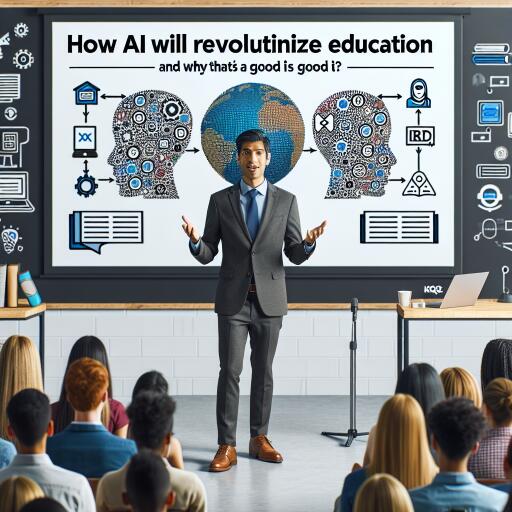Exploring the Educational Revolution: AI’s Promising Future in Learning
The educational landscape is on the cusp of a significant transformation, thanks to the advent of generative artificial intelligence technologies like ChatGPT, introduced in 2022. Initially met with skepticism, especially in academic circles where the immediate reaction was to prohibit its use over concerns of academic dishonesty, the narrative around AI in education is gradually shifting. Among the prominent voices advocating for the positive potential of AI in education is Sal Khan, the visionary behind the Khan Academy. Khan is leading the charge in reimagining how AI can enhance educational experiences rather than detract from them.
At the heart of Khan’s optimism is the development of educational AI platforms, such as Khan Academy’s latest innovation, Khanmigo. This AI-driven chatbot represents a breakthrough, designed to assist students in their studies while encouraging critical thinking rather than rote learning. The foundation of Khan’s argument lies in the belief that when deployed thoughtfully, AI can democratize education, offering personalized learning experiences akin to having a private tutor. Similarly, educators can benefit from AI as a valuable teaching assistant, thereby enhancing the overall quality of education.
The potential for AI to redefine the educational paradigm extends far beyond just personalized tutoring. Khan envisions a future where AI’s integration into educational settings fosters novel learning opportunities that are engaging, interactive, and tailored to meet diverse learning needs. This, however, necessitates careful planning, with a keen focus on programming and establishing protective measures to ensure AI’s application promotes integrity and accurateness in learning.
This transition towards an AI-augmented educational model is being driven by more than just technological advancement. It speaks to a broader intention to make learning more accessible, engaging, and adaptive to individual learner profiles. Khan’s advocacy for AI in education is encapsulated in his latest literary work, “Brave New Words,” which lays out a compelling blueprint for embracing AI to enrich education. The vision articulated by Khan is not merely about integrating new technologies into the classroom; it’s about catalyzing a pedagogical shift towards more inclusive and personalized learning environments that make education equitable and enjoyable for all students.
The implications of successfully integrating AI into educational systems are profound. They signify a shift from a one-size-fits-all teaching model to an approach that recognizes and nurtures individual potential, learning styles, and interests. For Khan, and indeed for the future of education, the promise of AI lies not in replacing human interaction but in enhancing it, providing educators with tools to better serve their students and equipping learners with resources to explore their academic curiosity unbounded.
As the debate around AI in education evolves, it is clear that perspectives like Khan’s are essential. They offer a balance between caution and optimism, highlighting the opportunities for growth while acknowledging the challenges. As education continues to adapt to the digital age, AI represents not just a technological innovation but a milestone in the continuous quest for a more inclusive, effective, and inspiring educational experience.









